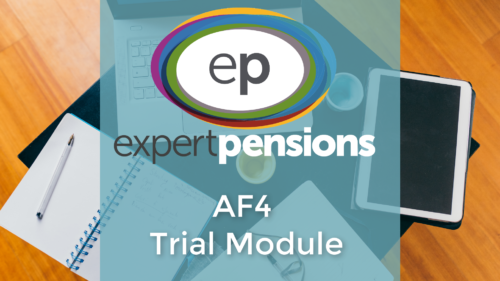AF4 Investment Planning
Our study plans and learning resources are designed by Experts who sit, know and understand the exam. By ensuring our study plans are engaging, relevant and exam focussed, we can keep you motivated and on track to transfer the learning into the exam. At Expert Pensions, we are dedicated to providing exceptional customer service and delivering high quality education to financial services professionals.
Our study plans have many unique elements:
- We firmly believe in understanding, learning and practice in context;
- Covering all the important facts
- We believe learning is a life-long process that is never fully completed
- Connecting with you
- Making learning fun!
AF4 Structured Study Plan
Our Structured Study plan provides a blended learning package which includes:
- Full essential study notes and workbook
- Video tutorials to explain and bring your study to life
- Weekly email to keep you on track
- Online quizzes to check understanding
- Weekly exam style questions with model answers
- Forum access to ‘ask the expert’ and interact with fellow students
- Revision Case Study workbook
- 2 x Mock exams
- Auto-generated CPD certificates
- 12 months access
- Note – Our AF4 Revision course is included within our structured study plan.
Courses To Buy
Courses To Buy
Download our AF4 Study Timetable
Revision Course
Are you looking for extra help in the lead up to your exam? Have you left it too late to join our Structured Study plan?
Our revision course is designed to make your revision sessions more effective. Remember, your focus shouldn’t be on HOW LONG you study but on HOW WELL you study!
Our AF4 Revision course is designed by subject specialists to provide you with the preparation and practice you need in the lead up to the exam. To achieve a pass in this exam you need to practice and prepare for the types of questions you will face on the day. It is not enough to have the technical knowledge alone…you need to be able to apply it to the exam, understand what to expect from the questions and how to construct your answers.
This revision course is ideal for students who feel they need a little extra support in the run up to their exams and can make a massive difference to your confidence, motivation, knowledge and exam technique.
What is included in the Revision course?
- 10 x Video tutorials (walking you through past exam questions, what to look for and how to construct your answer)
- Revision question workbook with model answers
- 2 x Mock exams with model answers
- Forum access to ‘ask the expert’ and interact with fellow students
- 12 months access
Please note that our revision course is included in our structured study plan.



